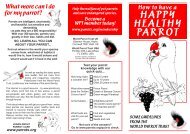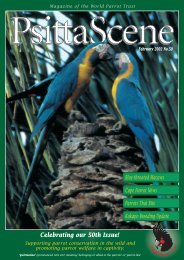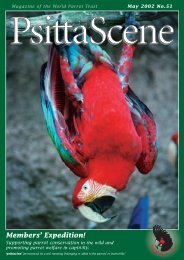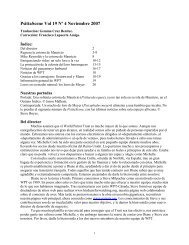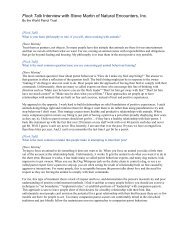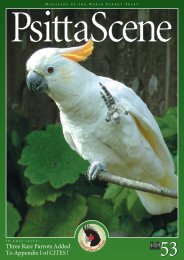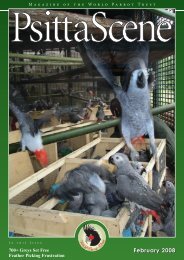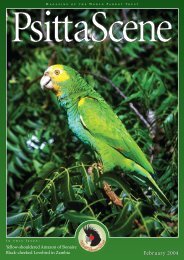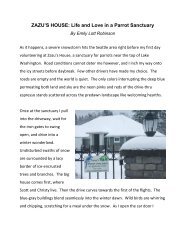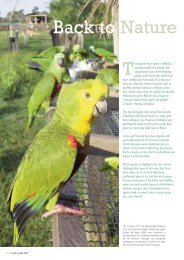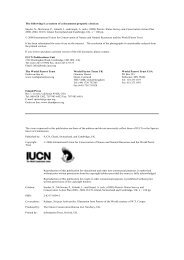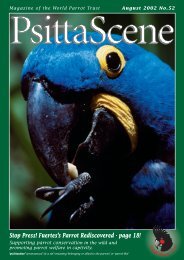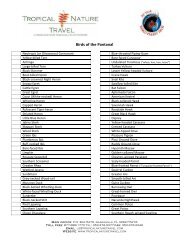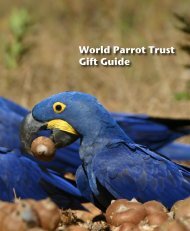Download - World Parrot Trust
Download - World Parrot Trust
Download - World Parrot Trust
You also want an ePaper? Increase the reach of your titles
YUMPU automatically turns print PDFs into web optimized ePapers that Google loves.
for breeding macaws, and asked<br />
the materials suppliers to<br />
contribute towards WPT.<br />
News from WPT -<br />
USA<br />
by GAIL BUHL<br />
A third of the world’s parrot<br />
species’ are declining. Some are<br />
very endangered, like the<br />
Hyacinth macaw featured in the<br />
<strong>World</strong> of Birds Show at<br />
Minnesota Zoo. Even though in<br />
the wild, these parrot live<br />
halfway around the world, in the<br />
show we talked about how the<br />
people of Minnesota can do<br />
something to help. All of us can<br />
recycle more, reduce what we<br />
use and reuse materials more<br />
effectively. This helps us locally<br />
but helps global habitats by<br />
reducing pollution and habitat<br />
destruction. People can also<br />
support conservation<br />
organisations like the zoo, or<br />
organisations like the <strong>World</strong><br />
<strong>Parrot</strong> <strong>Trust</strong>.<br />
The <strong>World</strong> <strong>Parrot</strong> <strong>Trust</strong> (WPT)<br />
was founded in 1989. They<br />
designated August as <strong>World</strong><br />
<strong>Parrot</strong> Month. What they strive<br />
to do is raise funds to donate to<br />
people / organisations that are<br />
doing field conservation work<br />
directly helping parrots in the<br />
wild. To date, they have<br />
contributed to projects in 22<br />
different countries helping 37<br />
different species of parrots. One<br />
of the other goals of the WPT is<br />
to promote the welfare of<br />
individual parrots kept in<br />
captivity by providing funding<br />
to educational programmes and<br />
promoting high standards in the<br />
keeping of parrots.<br />
The Bird Show staff decided that<br />
one direct way we can help is<br />
not only promoting <strong>World</strong> <strong>Parrot</strong><br />
Month in our show, but to “walk<br />
the talk” and try to raise money<br />
for the organisation. I am happy<br />
Gail Buhl fundraising for WPT at Minnesota Zoo.<br />
to say that the people in our<br />
audiences really responded by<br />
helping us raise $671.61. The<br />
show of support was very<br />
encouraging for conservation. It<br />
was wonderful for us to see that<br />
people seemed to be concerned<br />
and happy that they could<br />
contribute at least a little to the<br />
solution of some of the<br />
problems facing parrots in the<br />
wild.<br />
Smugglers trap<br />
Nigeria’s<br />
Endangered Grey<br />
<strong>Parrot</strong>s to Brink of<br />
Extinction<br />
Earth Times News Service by<br />
ABIODUN RAUFU<br />
26 September 1999<br />
Lagos, Nigeria. Until recently<br />
when the people of Ikodi village<br />
raised alarm about the rapid<br />
rate at which African Grey<br />
parrots were being smuggled<br />
out of Nigeria, the illegal export<br />
of the colourful bird had largely<br />
been going on for years<br />
unnoticed. Each parrot sells for<br />
at least $500 on the<br />
international pet market, most<br />
ending up in Europe,<br />
particularly Scotland which is<br />
regarded as the main base of the<br />
international market in African<br />
grey parrots.<br />
The parrot, Psittacus erithacus,<br />
is mainly found in the swamps<br />
and mangrove forests of West<br />
African countries like Nigeria,<br />
Cote d’Ivoire, Guinea, Sierra<br />
Leone, Ghana and Liberia. In<br />
Ikodi village, which is locally<br />
known as parrots paradise, on<br />
the south-eastern coast of the<br />
country, the grey birds with a<br />
scarlet tail can be found on the<br />
bank of Orashi River.<br />
The exact number of parrots<br />
An African Grey <strong>Parrot</strong><br />
there is not known. But the<br />
parrots which live on the<br />
clustered tall palm trees of the<br />
community’s forest is estimated<br />
to run into several thousands.<br />
The tall palm trees protect the<br />
birds from predators, while the<br />
trees’ clustered nature gives<br />
them a sense of communality.<br />
The poachers having failed to<br />
induce the Ikodi people to trap<br />
the parrots for them went to the<br />
neighbouring villages where<br />
they hired young men to raid<br />
the Ikodi community forest to<br />
trap the parrots. The trappers<br />
are paid about N1,00 (about<br />
US$10) for each parrot. The<br />
result has been violent clashes<br />
between the trappers and the<br />
Ikodi villagers.<br />
One such clash recently left two<br />
Ikodi youths dead. Efforts by the<br />
Ikodis to get justice has so far<br />
been unsuccessful as local<br />
authorities have been unwilling<br />
to get involved. “My appeal is<br />
that government should come to<br />
our aid,” says Chief Wilberforce<br />
Aleme, the embattled head of<br />
Ikodi village.<br />
Meanwhile, the poaching of the<br />
parrots continue unabated as<br />
the poachers attempt to satisfy<br />
the high demand for the birds.<br />
The African grey parrot is<br />
valued as pet because of its<br />
beauty and intelligence which is<br />
reflected in its unusual ability to<br />
mimic human beings.<br />
Mike Pugh of the London-based<br />
<strong>World</strong> Society of the Protection<br />
of Animals (WSPA) who has been<br />
on the trail of wildlife smugglers<br />
says unscrupulous local officials<br />
are bribed by smugglers to<br />
provide the necessary clearance<br />
papers. Pugh also says he<br />
discovered that the airport<br />
through which most of the<br />
wildlife are exported out of<br />
Nigeria is the Aminu Kano<br />
International Airport in the<br />
northern city of Kano. “At the<br />
airport, I saw a man carrying a<br />
crate being prepared to export<br />
five chimps, one gorilla and, in a<br />
separate compartment, 250<br />
African grey parrots.” says Pugh.<br />
The poachers’ gain is however<br />
Ikodi’s loss as the poachers’<br />
activities threaten the<br />
community’s local economy<br />
which is based on the<br />
conservation of the parrots.<br />
Though the villagers are mainly<br />
farmers and fishermen, they<br />
also sell feathers of the parrots<br />
which fall off naturally to<br />
augment their income. Each<br />
feather is sold for N15 (about 15<br />
cents) to middlemen who come<br />
to the village to buy the feathers<br />
in bulk to resell to people for<br />
ornamental purposes and as<br />
vital ingredient in making local<br />
drugs for a number of illnesses.<br />
Easy accessibility to the parrot’s<br />
feathers has reduced poverty in<br />
Ikodi and no one goes hungry<br />
when all it takes to feed is to<br />
walk into the community forest<br />
to pick feathers.<br />
Local people are forbidden by<br />
age-old custom from killing the<br />
birds or felling the trees on<br />
which they live. Bush burning<br />
near the parrots’ habitat is also<br />
prohibited. The villagers<br />
conserve the birds also because<br />
of the tourist potential. “We<br />
want this settlement to be made<br />
a tourist attraction in<br />
conjunction with the<br />
community,” says Chief Aleme.<br />
“If we have a road, water and<br />
light, those who want to see<br />
these birds can come easily in<br />
and out and see them.”<br />
Nigeria has a 14 year old law<br />
which prohibits poaching or<br />
trading in endangered species.<br />
But so far no one has been<br />
successfully prosecuted under<br />
the law which prescribes sixmonth<br />
sentence without option<br />
of fine if caught. While calling<br />
for immediate government<br />
intervention, ERA recently called<br />
for the use of forest guards into<br />
the parrots abode, prosecution<br />
of poachers responsible for the<br />
recent killing of Ikodi youths,<br />
and enforcement of the law on<br />
endangered wildlife.<br />
In addition ERA “calls for<br />
international pressure on the<br />
Nigerian government to take<br />
steps to live up to its<br />
commitment as a CITES<br />
signatory”.<br />
PsittaScene Volume 11, No 4, November 1999 ■ 17



